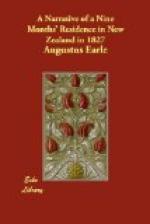I imagine that one reason of no outrage having been committed during this solemn occasion was our brig being on the point of sailing, and previous to her departure a great deal of traffic was expected to be carried on with the natives, for there was still a considerable quantity of muskets undisposed of; and I think, in this instance, avarice overcame filial affection—the minds of the chief’s family being so intent upon obtaining good bargains, that they had not time to sit and mourn over their departed parent, nor to work themselves up into a paroxysm of passion sufficiently violent to cause them to murder their slaves. This afforded me a convincing proof that as soon as they are occupied by commerce, or the useful arts, their barbarous rites will gradually be discontinued, and will speedily cease altogether.
Our brig having sailed, we were again alone with these wild yet interesting people. We expected our stay might be about six months, and had provided a stock-in-trade, consisting of a barrel of powder, half a dozen muskets, some fish-hooks, and a quantity of tobacco. Everything we possessed we delivered into the hands of the natives, who accounted to us for the stock thus entrusted to their management with the most scrupulous exactness. Nothing can be fairer than their mode of bartering with the Europeans; the prices are fixed; ten large hogs, or 120 baskets of potatoes (about a ton and a-half), are given for a musket; for small articles, such as fish, Indian corn, or fruits, the ready money are fish-hooks and tobacco. As we were now about to become inhabitants of New Zealand, it became necessary that we should be well acquainted with the particulars of their methods of “doing business,” and that we should apply ourselves diligently to the study of the language, which we acquired much more readily than I had anticipated.
CHAPTER XXII.
BRUTAL MURDER OF A WIFE.




